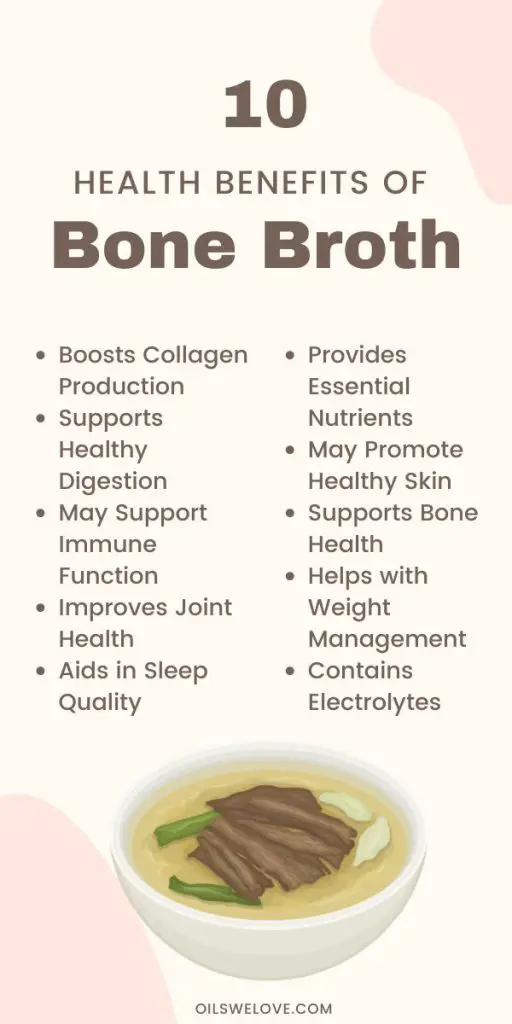Bone broth has been buzzing in the health community, especially when it comes to joint health.
Rich in nutrients like collagen, amino acids, and minerals, bone broth is more than just a culinary trend. Packed with benefits ranging from reducing inflammation to promoting cartilage repair, this traditional soup is making a modern comeback as a go-to remedy for joint issues.
Whether you’re dealing with arthritis or just looking to keep your joints in top shape, you’ll find some valuable takeaways here.

- 2-Week anti-inflammatory meal plan.
- 45 Foods that Cause Inflammation
- 31 Things to Avoid on Food Labels
- Grocery Lists. Challenges. Symptoms Tracker

Bone Broth is Rich in Collagen: Nature’s Joint Protector
Bone broth is more than just a comforting soup. It’s a powerhouse of collagen, a protein that forms a major component of cartilage, essential for maintaining joint health. In this article, we’ll dive into the multiple benefits of bone broth, particularly focusing on its collagen content and its positive impact on joint health.
What is Collagen?
Collagen is the most abundant protein in our bodies, making up around one-third of its protein content. It’s found in muscles, bones, skin, and tendons, providing structure and strength. As we age, our bodies produce less collagen, leading to aches, pains, and visible signs of aging.
How Does Collagen Benefit Joint Health?
Collagen plays a crucial role in maintaining the integrity of our cartilage, the rubbery tissue that protects our joints. It acts as a cushion, absorbing the impact of movements and reducing friction. Here are some ways collagen, derived from bone broth, contributes to joint health:
- Supports Joint Structure: Collagen helps maintain the structural integrity of cartilage, the tissue that covers and protects the ends of bones in your joints. When you consume bone broth, you provide your body with the amino acids necessary to reinforce and regenerate cartilage.
- Reduces Inflammation: Collagen contains amino acids like glycine and proline that have been shown to reduce inflammation. Given that inflammation is a primary cause of joint pain, consuming bone broth can help soothe and manage this discomfort.
- Improves Mobility: By supporting cartilage and reducing inflammation, collagen can enhance overall joint function. Many athletes and active individuals find that regular consumption of bone broth helps them maintain flexibility and mobility.
Scientific Backing for Collagen’s Benefits
Research supports the efficacy of collagen in promoting joint health. A study published in the National Institutes of Health shows that collagen supplements can significantly reduce joint pain among athletes. Participants reported an improvement in their joint function, illustrating collagen’s potential to bolster joint health.
Bone Broth: A Rich Source of Collagen
Bone broth is a nutrient-dense liquid made by simmering bones, connective tissues, and vegetables for an extended period. This process extracts a wealth of nutrients, including collagen. Here’s why bone broth is a fantastic way to incorporate collagen into your diet:
- Easy to Digest: The long-simmering process breaks down collagen into gelatin, which is easier for your body to absorb. This means you get a concentrated dose of joint-supporting nutrients in every serving.
- Nutrient-Rich: Besides collagen, bone broth is packed with other beneficial nutrients like glucosamine, chondroitin, magnesium, and calcium. These work in tandem to support joint health and overall wellness.
- Versatile and Delicious: Bone broth can be consumed on its own, used as a base for soups and stews, or added to sauces and gravies. This versatility makes it easy to incorporate into your daily diet.
How to Make Bone Broth at Home
Making bone broth at home is straightforward and rewarding. Here’s a simple recipe to get you started:
- Ingredients:
- 2-3 pounds of bones (beef, chicken, or fish)
- 1 onion, chopped
- 2 carrots, chopped
- 2 celery stalks, chopped
- 2 tablespoons of apple cider vinegar
- Water to cover
- Salt and pepper to taste
- Instructions:
- Place the bones and chopped vegetables in a large pot or slow cooker.
- Add apple cider vinegar and enough water to cover the contents.
- Bring to a boil, then reduce to a simmer for 12-24 hours. The longer you simmer, the more nutrients you’ll extract.
- Strain the broth through a fine mesh sieve, discard solids, and season with salt and pepper.
- Store in the refrigerator for up to 5 days or freeze for later use.
Tips for Maximizing Collagen Intake
To ensure you’re getting the most collagen from your bone broth, consider these tips:
- Use a Variety of Bones: Incorporate a mix of marrow bones, knuckle bones, and meaty bones. This combination will provide a richer broth with higher collagen content.
- Simmer for Longer Periods: The longer you cook the broth, the more collagen you’ll extract from the bones and connective tissues. Aim for at least 12 hours of simmering.
- Include Acidic Ingredients: Adding apple cider vinegar helps break down the collagen in the bones, enhancing its release into the broth.
Incorporating Bone Broth Into Your Diet
Once you’ve made your bone broth, there are several ways to incorporate it into your diet effectively:
- Morning Beverage: Start your day with a warm cup of bone broth. It’s a soothing and nutritious way to kickstart your morning.
- Smoothie Booster: Add a splash of bone broth to your smoothies for an extra dose of collagen and nutrients without altering the flavor significantly.
- Cooking Liquid: Use bone broth as a base for cooking grains like rice or quinoa. It infuses them with extra flavor and nutrients.
Many health experts endorse the benefits of bone broth for joint health. Nutritionists and dietitians often recommend it as a natural and holistic approach to maintaining joint function and reducing pain. The combination of collagen, amino acids, and minerals makes it a valuable addition to any diet.




